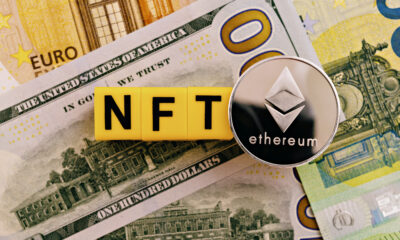News
Peer-To-Peer Bitcoin Trading Protocol Hits Milestone
Published
4 weeks agoon
By
admin

Civkit, a project attempting to revitalize the global peer-to-peer economy, announced the release of its first alpha version following over a year of dedicated development. The protocol aims to enable peer-to-peer trading in a decentralized manner, eliminating the need for a centralized order book. The design is architected around Nostr and Lightning, with a reputation system at its core.
A team of anonymous developers, led by Nicholas Gregory (Commerceblock, MercuryLayer), has been working behind the scenes to bring this vision to life. “The project is funded by people in the global south. Much of the work has involved understanding their actual needs rather than imposing our assumptions,” says Gregory. “Ray Youseff and Noones have provided funding for some developers, including one who lives in the global south, allowing us to test in regions where this solution is most needed.”
The Civkit Node provides a UI to create P2P trade orders. You can use this to create buy/sell orders for peer-to-peer trades, pay the hold invoices, chat with the trading partner, confirm fiat received to release payment, raise disputes (in the chat app), and view other trade orders.
Using a custom Nostr event type, CivKit allows orders to be shared among Nostr relays accepting these types to create a global orderbook. The escrow system returns BOLT11 invoices, locking 5% of the trade amount in a hold invoice which is released upon trade completion. A URL is provided to access the encrypted chat, which includes basic dispute features.
The team expects the alpha version of the Civkit reputation system to be released in two weeks. Following this, the focus will shift to federating the order book and escrow with Fedimint, and subsequently incorporating eCash support.
“This is a very ambitious project with a long way to go, but it’s exciting to see our first tangible results,” Gregory adds.
Source link
You may like


BC.GAME Announces the Partnership with Leicester City and New $BC Token!


What’s the best new crypto in 2024?


Bitcoin Mining Difficulty Crashes 5% To Lowest Level In 3 Months, What Happens Next?


Bitcoin (BTC) Price, Volume Contrasts In Fight For Rebound


The German Government Is Selling More Bitcoin – $28 Million Moves to Exchanges


BC.GAME Announces the Partnership with Leicester City and New $BC Token!
bitcoin exchanges
The German Government Is Selling More Bitcoin – $28 Million Moves to Exchanges
Published
5 hours agoon
July 8, 2024By
admin

The German government continued shifting portions of its massive Bitcoin trove to exchanges on Monday, transferring over $56 million worth across multiple transactions.
According to blockchain data, addresses linked to the German government moved a total of 500 BTC to Bitstamp and Coinbase (250 BTC each), worth about $27.9 million, at 14:48 UTC+8 today, and transferred 500 BTC to an unmarked address.
JUST IN: 🇩🇪 German Government sends another 1,000 #Bitcoin worth $56 million to exchanges 👀 pic.twitter.com/zsxg3q2tkV
— Bitcoin Magazine (@BitcoinMagazine) July 8, 2024
Germany originally seized nearly 50,000 Bitcoin back in 2013 from the operators of the now-defunct piracy website Movie2K. The stash is estimated to be worth around $2.3 billion at today’s prices.
This comes after the government shifted around $390 million in Bitcoin to various platforms since mid-June.
The steady flow of transfers to exchanges signals Germany’s potential intentions to liquidate parts of its reserves. While reasons remain uncertain, the sales have fueled volatility in Bitcoin’s price, which dipped below $55,000 last week.
However, the amounts shifted so far equate to a relatively small portion of Germany’s massive holdings. After the latest transactions, the government still possesses around 40,000 bitcoins valued at nearly $2.2 billion.
Nonetheless, the remaining reserves represent a significant share of daily Bitcoin trading volumes. As such, experts caution the threat of further turbulence lingers as long as Germany stays active in reducing exposure.
The liquidations come just as long-awaited creditor payouts from Mt. Gox’s 2014 collapse appear set to begin. This timing might compound selling pressure on Bitcoin amid an already bearish macro environment.
Source link
Altcoins
Justin Sun Says TRON Team Designing New Gas-Free Stablecoin Transfer Solution
Published
6 hours agoon
July 8, 2024By
admin
Justin Sun has announced that developers are now working on a stablecoin transfer solution that can function without gas fees on the TRON (TRX) network.
The crypto billionaire says the new service is set to roll out later this year, initially on TRON before expanding to Ethereum (ETH) and other EVM-compatible chains.
“Our team is developing a new solution that enables gas-free stablecoin transfers. In other words, transfers can be made without paying any gas tokens, with the fees being entirely covered by the stablecoins themselves.
This innovation will first be implemented on the Tron blockchain and later support Ethereum and all EVM-compatible public chains.
We anticipate launching this service in Q4 of this year. I believe that similar services will greatly facilitate large companies in deploying stablecoin services on the blockchain, elevating blockchain mass adoption to a new level.”
At time of writing, it’s unclear how the new service will be able to operate without gas fees.
Last month, market intelligence firm Lookonchain reported that the 24-hour trading volume of Tether’s USDT on TRON stood at $53 billion while payment giant Visa’s was only at $42 billion.
“The 24-hour trading volume of USDT on TRON Network is $53 billion, exceeding Visa’s average daily trading volume. Visa’s trading volume in Q1 2024 was $3.78 trillion and the average daily trading volume was $42 billion.”
Don’t Miss a Beat – Subscribe to get email alerts delivered directly to your inbox
Check Price Action
Follow us on X, Facebook and Telegram
Surf The Daily Hodl Mix
 

Disclaimer: Opinions expressed at The Daily Hodl are not investment advice. Investors should do their due diligence before making any high-risk investments in Bitcoin, cryptocurrency or digital assets. Please be advised that your transfers and trades are at your own risk, and any losses you may incur are your responsibility. The Daily Hodl does not recommend the buying or selling of any cryptocurrencies or digital assets, nor is The Daily Hodl an investment advisor. Please note that The Daily Hodl participates in affiliate marketing.
Generated Image: DALLE3
Source link
bear market
Mt. Gox is a ‘thorn in Bitcoin’s side,’ analyst says
Published
7 hours agoon
July 8, 2024By
admin

Bitcoin struggled amid recent Mt. Gox repayments and market trends, but the bearish behavior shouldn’t be interpreted as unfavorable.
Last week, Bitcoin (BTC) concluded the week at approximately $55,850, marking an 11% drop from the prior week’s closing price of $62,775. The week saw signficant selling pressure, with BTC dipping to as low as $53,500 on Thursday before rebounding to $58,250 and finally settling at $55,850.
BTC Spot ETFs recorded $238 million in net inflows during the downturn. Cumulative trading volume since inception stands at around $315 billion, showcasing a decline in trading activity. This aligns with typical market behavior, as Q3 usually witnesses lower trading activity.
“This data should not be seen negatively but rather as a seasonal trend, especially among traditional finance investors,” noted Matteo Greco, Research Analyst at Fineqia International.
Interestingly, the decline showed no correlation with BTC Spot ETF flows, a deviation from historical patterns where ETF flows significantly influenced price movements.
“However, for the first time since their inception, there is a noticeable decoupling between price action and capital flows, indicating that recent price behaviour has been driven mainly by trading activity within the crypto-native space,” added Greco.
Mt. Gox
The high on-chain selling pressure is partly due to the commencement of long-awaited Mt. Gox repayments.
Founded in 2010, Mt. Gox quickly became the world’s largest Bitcoin exchange. Its success was short-lived as it abruptly halted trading, shut down its website, and filed for bankruptcy protection in early 2014, revealing the loss of approximately 850,000 BTC, worth about $450 million at the time, due to thefts from its hot wallets over several years starting as early as late 2011.
Official confirmation of repayments, marked by the movement of 47,228 BTC from a Mt. Gox-associated cold wallet, has triggered market reactions. Additionally, after a recent halving that reduced mining rewards by 50%, miners’ selling pressure continues to affect prices, though it has decreased recently.
The recent drawdown has notably reduced unrealized profits, driven by long-term holders selling their coins. The MVRV ratio now stands at around 1.5, indicating an average unrealized profit of 50% among market participants, down from over 200% in March.
“This trend suggests that recent price action was mainly due to long-term holders taking profits and selling their coins to new buyers at higher purchase prices,” Greco added.
Source link
BC.GAME Announces the Partnership with Leicester City and New $BC Token!

What’s the best new crypto in 2024?

Bitcoin Mining Difficulty Crashes 5% To Lowest Level In 3 Months, What Happens Next?
Bitcoin (BTC) Price, Volume Contrasts In Fight For Rebound

The German Government Is Selling More Bitcoin – $28 Million Moves to Exchanges
BC.GAME Announces the Partnership with Leicester City and New $BC Token!

Justin Sun Says TRON Team Designing New Gas-Free Stablecoin Transfer Solution

Mt. Gox is a ‘thorn in Bitcoin’s side,’ analyst says

XRP Eyes Recovery Amid Massive Accumulation, What’s Next?

Germany Moves Another $28 Million in Bitcoin to Bitstamp, Coinbase

'Asia's MicroStrategy' Metaplanet Buys Another ¥400 Million Worth of Bitcoin

BlackRock’s BUIDL adds over $5m in a week despite market turbulence

Binance To Delist All Spot Pairs Of These Major Crypto

German Government Sill Holds 39,826 BTC, Blockchain Data Show

HIVE Digital stock rallies over 9% as Bitcoin miner bolsters crypto reserves to 2.5k BTC

Bitcoin Dropped Below 2017 All-Time-High but Could Sellers be Getting Exhausted? – Blockchain News, Opinion, TV and Jobs

What does the Coinbase Premium Gap Tell us about Investor Activity? – Blockchain News, Opinion, TV and Jobs
BNM DAO Token Airdrop
A String of 200 ‘Sleeping Bitcoins’ From 2010 Worth $4.27 Million Moved on Friday

NFT Sector Keeps Developing – Number of Unique Ethereum NFT Traders Surged 276% in 2022 – Blockchain News, Opinion, TV and Jobs
New Minting Services

Block News Media Live Stream

SEC’s Chairman Gensler Takes Aggressive Stance on Tokens – Blockchain News, Opinion, TV and Jobs

Friends or Enemies? – Blockchain News, Opinion, TV and Jobs

Enjoy frictionless crypto purchases with Apple Pay and Google Pay | by Jim | @blockchain | Jun, 2022

How Web3 can prevent Hollywood strikes

Block News Media Live Stream

Block News Media Live Stream

Block News Media Live Stream

XRP Explodes With 1,300% Surge In Trading Volume As crypto Exchanges Jump On Board
Trending

 Altcoins2 years ago
Altcoins2 years agoBitcoin Dropped Below 2017 All-Time-High but Could Sellers be Getting Exhausted? – Blockchain News, Opinion, TV and Jobs

 Binance2 years ago
Binance2 years agoWhat does the Coinbase Premium Gap Tell us about Investor Activity? – Blockchain News, Opinion, TV and Jobs
- Uncategorized3 years ago
BNM DAO Token Airdrop

 Bitcoin miners2 years ago
Bitcoin miners2 years agoA String of 200 ‘Sleeping Bitcoins’ From 2010 Worth $4.27 Million Moved on Friday

 BTC1 year ago
BTC1 year agoNFT Sector Keeps Developing – Number of Unique Ethereum NFT Traders Surged 276% in 2022 – Blockchain News, Opinion, TV and Jobs
- Uncategorized3 years ago
New Minting Services

 Video2 years ago
Video2 years agoBlock News Media Live Stream

 Bitcoin1 year ago
Bitcoin1 year agoSEC’s Chairman Gensler Takes Aggressive Stance on Tokens – Blockchain News, Opinion, TV and Jobs

